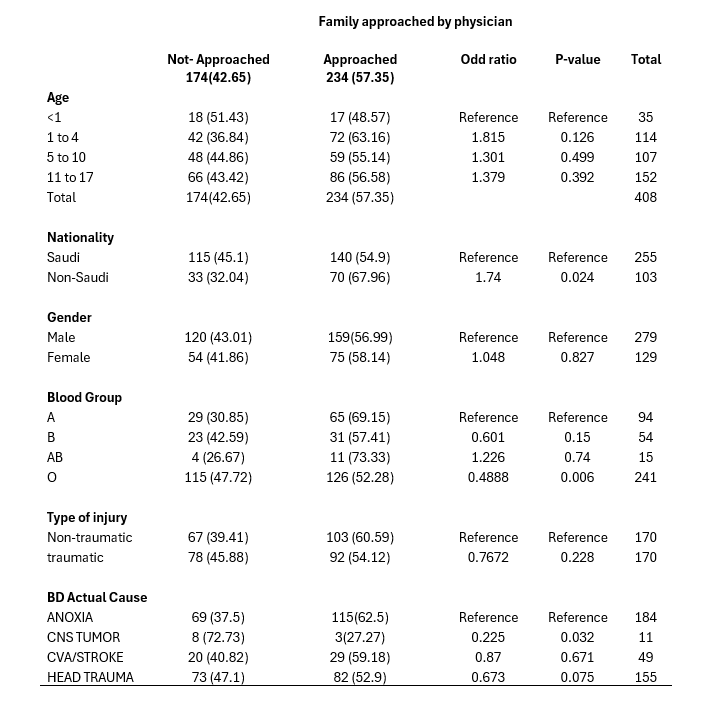Predictors of physician approach and family consent in pediatric deceased organ donation: A five-year retrospective study
Lina Aldakhil1.
1Research and Development, Saudi Center for organ Transplantation, Riyadh, Saudi Arabia
Background: Physician-family communication plays a critical role in obtaining consent for pediatric deceased organ donation. However, limited data exist on how demographic and clinical factors influence physician approach and family consent decisions, particularly in non-Western settings such as Saudi Arabia.
Objective: To identify factors associated with physician approach and family consent for organ donation among pediatric deceased potential donors in Saudi Arabia between 2019 and 2023.
Methods: This retrospective study utilized national data from the Saudi Center for Organ Transplantation. Pediatric potential donors under 18 years of age were included. Sociodemographic and clinical variables (age, gender, nationality, blood group, type of injury, and cause of brain death) were analyzed. Logistic regression was used to assess associations with two binary outcomes: physician approach and family consent.
Results:Among 410 pediatric potential donors, 57.4% were approached by physicians. Non-Saudi donors were significantly more likely to be approached (OR = 1.74, p = 0.024). Blood type O was associated with lower approach rates compared to type A (OR = 0.49, p = 0.006). Donors with CNS tumors were less likely to be approached than those with anoxia (OR = 0.23, p = 0.032).
Consent was obtained in 17.4% of approached cases. Non-Saudi families were significantly more likely to consent (OR = 9.43, p < 0.001). Blood type B was associated with higher consent rates than type A (OR = 3.42, p = 0.018). Trauma-related deaths, particularly head trauma, were linked to lower consent rates (OR = 0.29, p = 0.012).

Conclusion:Significant disparities exist in physician approach and family consent based on nationality, blood type, and cause of brain death. The notably lower consent rates among Saudi families highlight the need for targeted national interventions, improved physician communication strategies, and public awareness efforts to increase consent rates and optimize pediatric organ donation practices in Saudi Arabia.
[1] Pediatric organ donation
[2] Brain death
[3] Family consent
[4] Physician approach
[5] Deceased donors
[6] Saudi Arabia